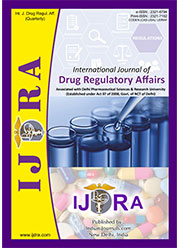Regulation of Medicines in Bhutan: Current Status, Challenges and Opportunities
Abstract
Medicines Regulatory Agencies (MRAs) are responsible for evaluation of quality, safety and efficacy of medicinal products before it is approved for consumption. The regulatory procedures, however, differs from one country to another. Medical products including vaccines, blood and blood products, diagnostics and medical devices are essential for healthcare delivery across the world. The Drug Regulatory Authority (DRA) is an independent national agency for regulation of medicinal products in Bhutan and reports to Bhutan Medicines Board (BMB), the highest policy making body for regulation of medicinal products in the country.
Medicines Act of the Kingdom of Bhutan is the legal tool for regulation of medicines in Bhutan. Medicinal products are regulated through premarketing and post-marketing control systems. All medicinal products available in the Bhutanese market are registered. DRA regulates all the medicinal products including vaccines, blood products and traditional medicines used for human and veterinary.
DRA is fully financed by the Government of Bhutan. Bhutan’s medicines regulatory system has evolved over the last one decade. However, as the regulatory mandate continues to increase, DRA is faced with several challenges in terms of human resource, infrastructure and testing laboratory among others. There are also opportunities for the DRA to improve its regulatory capacities to ensure availability of quality and safe medicines for the public.
Understanding the current practice of medicines regulation in Bhutan can help identify gaps and existing opportunities for improving the regulatory capacity. This article documents the existing practices, challenges and opportunities for regulation of medicinal products in Bhutan.
Downloads
References
2. Kashyap NU, Gupta V, Raghunandan C HP. Comparision of Drug Approval Process in United States and Europe. J Pharm Sci. 2013; 5(6):131–6.
3. Ndomondo-sigonda M, Miot J, Naidoo S, Dodoo A, Kaale E. Medicines Regulation in Africa:Current State and Opportunities. Pharmaceut Med. 2017; 31(6):383–97.
4. Reggi V. Medicines regulatory harmonization: international collaboration as a key to improve public health. Med Access @ Point Care. 2017; 1(1):2–5.
5. Ndomondo-Sigonda M, Ambali A. The African medicines regulatory harmonization initiative: rationale and benefits. Clin Pharmacol Ther. 2011; 89(2):176–8.
6. World Health Organization [Internet]. Handbook of resolutions and decisions of the World Health Assembly and the Executive Board; 1972 [Cited 2018 Mar 12]. Available from:
http://apps.who.int/iris/handle/10665/79012.
7. Assessment of Medicines Regulatory Systems in Sub-Saharan African Countries. An overview of findings from 26 Assessment Reports [Internet]. World Health Organization; 2010 [Cited 2018 May 10]. Available from:
http://apps.who.int/medicinedocs/documents/s17577en/s17577en.pdf%5Cnhttp://apps.who.int/medicinedocs/en/m/abstract/Js17577en/.
8. Ratanawijitrasin S, Wondemagegnehu E. Effective drug regulation: A multicountry study. WHO Libr Cat Data; 2002.
9. Chejor P. Blood and Blood Products Regulation in Bhutan: Progress and Challenges. J Med Sci and Clin Res. 2018; 06(05):1128-32.
10. DRA. List of Medicinal Products registered with DRA [Internet] Bhutan: Official websiet of Drug Regulatory Authority [Cited 2018 Mar 12]. Available from:
https://docs.google.com/spreadsheets/d/1mecY8dp48S0zVddJjpmzSJwho-mEgyGnICJSxiexXps/edit#gid=0.
11. DRA. List of Retailers and Wholesalers in Bhutan [Internet]. Bhutan: Official websiet of Drug Regulatory Authority [Cited 2018 Mar 12]. Available from:
https://docs.google.com/spreadsheets/d/10U6Oz4BDytmxd7zyIg03aqd4DVkLHaS8YZrDzy2Nxys/edit#gid=0.
12. Thumm M, Gaparay P, Goredema W, Tjipura D. Assessment of medicines regulatory systems in angola: report. Arlington: Management of Science; 2013.
13. Kamwanja L, Saka J, Awotedu A, Fute I, Ndomondo-Sigonda M. Situation Analysis Study on Medicines Registration Harmonization in Africa: Final Report for the Economic Community of West African States (ECOWAS); 2010.
14. National Drug Policy [Internet]. Ministry of Health; 2007 [Cited 2018 May 02]. Available from:
http://dra.gov.bt/wp-content/uploads/2017/07/National-Drug-Policy-2007.pdf.
15. Guideline for Application for Registration of Medicinal Products [Internet]. Drug Regulatory Authority; 2013 [Cited 2018 May 11]. Available from:
http://dra.gov.bt/wp-content/uploads/2015/07/Bhutan-Medicines-Rules-and-Regulation-2012.pdf.
16. Bhutan Medicines Rules and Regulation [Internet]. Drug Regulatory Authority, 2012 [cited 2018 Apr 20]. Available from:
http://dra.gov.bt/wp-content/uploads/2015/07/Bhutan-Medicines-Rules-and-Regulation-2012.pdf.
17. Minutes of the 16th BMB Meeting [Internet]. Drug Regulatory Authority, 2017 [cited 2018 Apr 2]. Available from:
https://drive.google.com/drive/folders/0Bzj2O5Bryu-LdHVxclhUcGFfWEE.
18. Narsai K, Williams A, Mantel-Teeuwisse AK. Impact of regulatory requirements on medicine registration in African countries - perceptions and experiences of pharmaceutical companies in South Africa. South Med Rev 2012; 5(1):31–7.
19. Dorji C, Tragulpiankit P, Riewpaiboon A, Al E. Knowledge of Adverse Drug Reaction Reporting Among Healthcare Professionals in Bhutan: A Cross-Sectional Survey. Drug Saf. 2016; 39:1239.
20. Pharmacovigilance Guide for Adverse Drug Reaction Monitoring and Causality Assessment [Internet]. Drug Regulatory Authority; 2017 [cited 2018 May 11]. Available from:
https://drive.google.com/file/d/0Bzj2O5Bryu-LSmZvV1RTRnhNZlZHT2tpWkgxb3FFWmZPMXFJ/view.
21. Onakpoya IJ, Heneghan CJ, Aronson JK. Post-marketing withdrawal of 462 medicinal products because of adverse drug reactions: A systematic review of the world literature. BMC Med. 2016; 14(1):1–11.
22. World Health Organization (WHO). Resolution on the regional strategy on regulation of medical products in the African Region 2016-2025 (Documents AFR/RC66/13 and AFR/RC66/R2; 2016 Nov
23. Moran M, Strub-Wourgaft N, Guzman J, Boulet P, WuL PB. Registering New Drugs for Low- Income Countries: The African Challenge. PLoS Med. 2011;8(2).

This work is licensed under a Creative Commons Attribution-NonCommercial 4.0 International License.
The International Journal of Drug Regulatory affairs require a formal written transfer of copyright from the author(s) for each article published. We therefore ask you to complete and return this form, retaining a copy for your records. Your cooperation is essential and appreciated. Any delay will result in a delay in publication.
I/we have read and agree with the terms and conditions stated Page 2 of this agreement and I/we hereby confirm the transfer of all copyrights in and relating to the above-named manuscript, in all forms and media, now or hereafter known, to the International Journal of Drug Regulatory affairs, effective from the date stated below. I/we acknowledge that the IJDRA is relying on this agreement in publishing the above-named manuscript. However, this agreement will be null and void if the manuscript is not published in the IJDRA.
Download link for COPYRIGHT FORM







